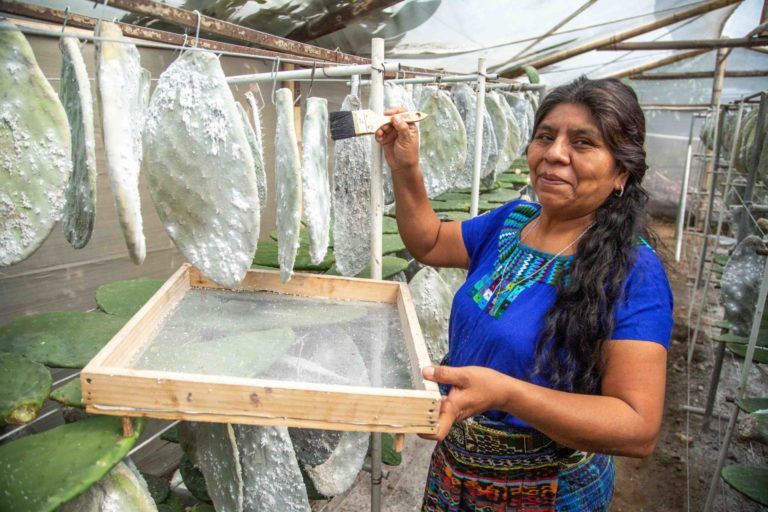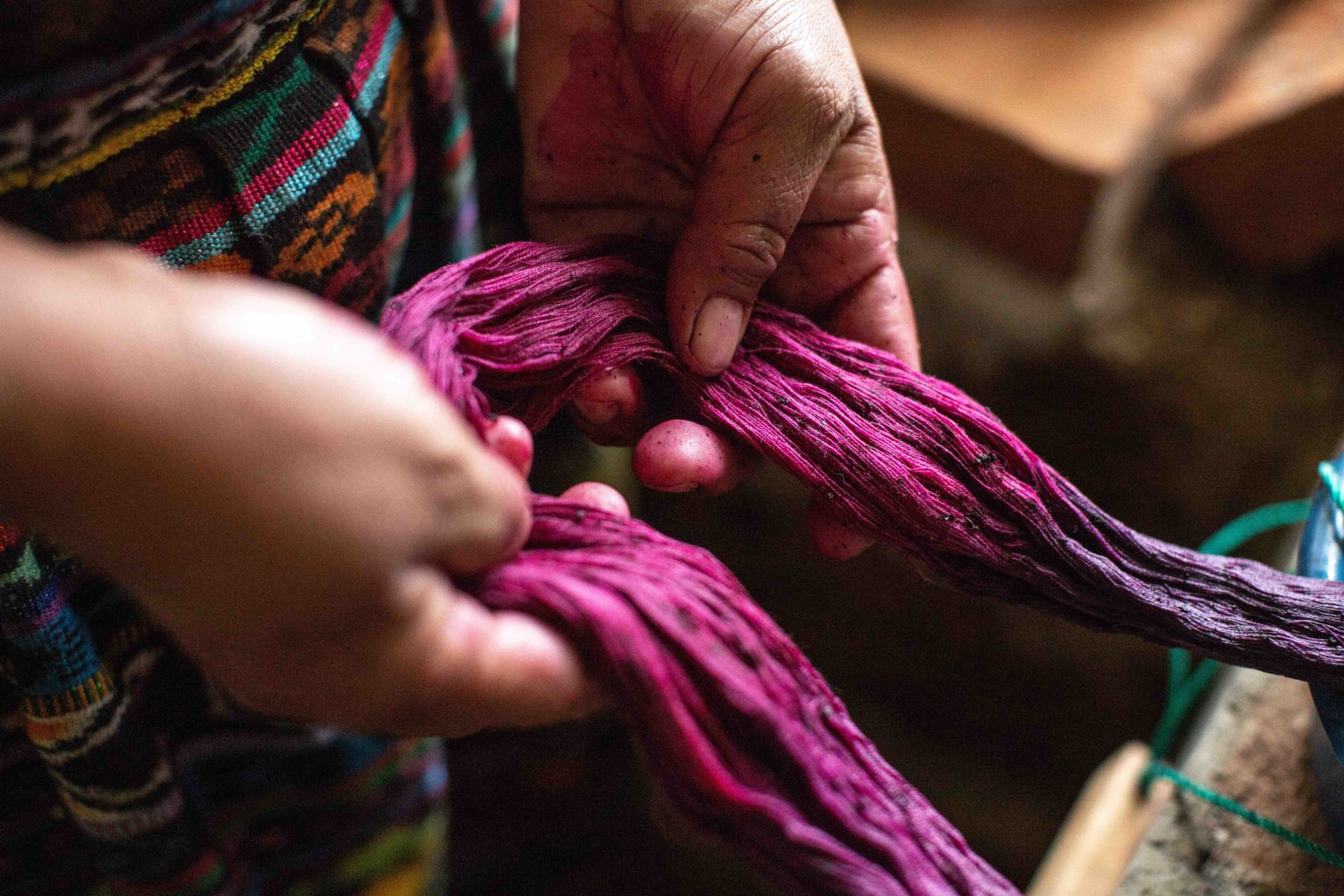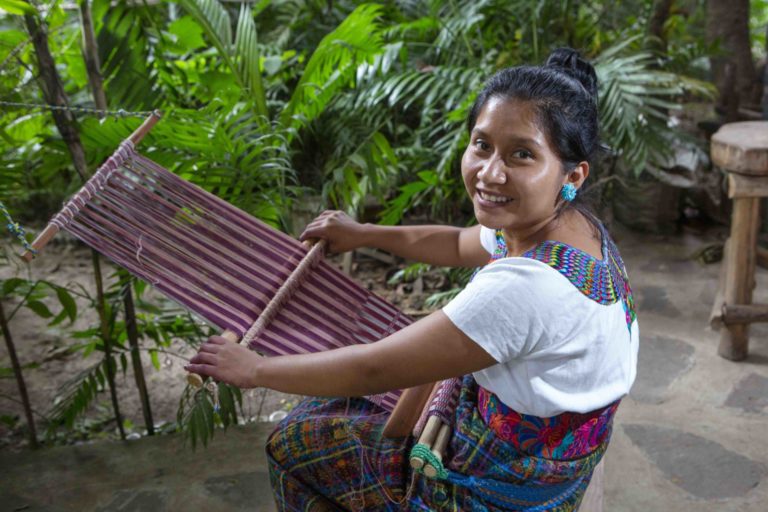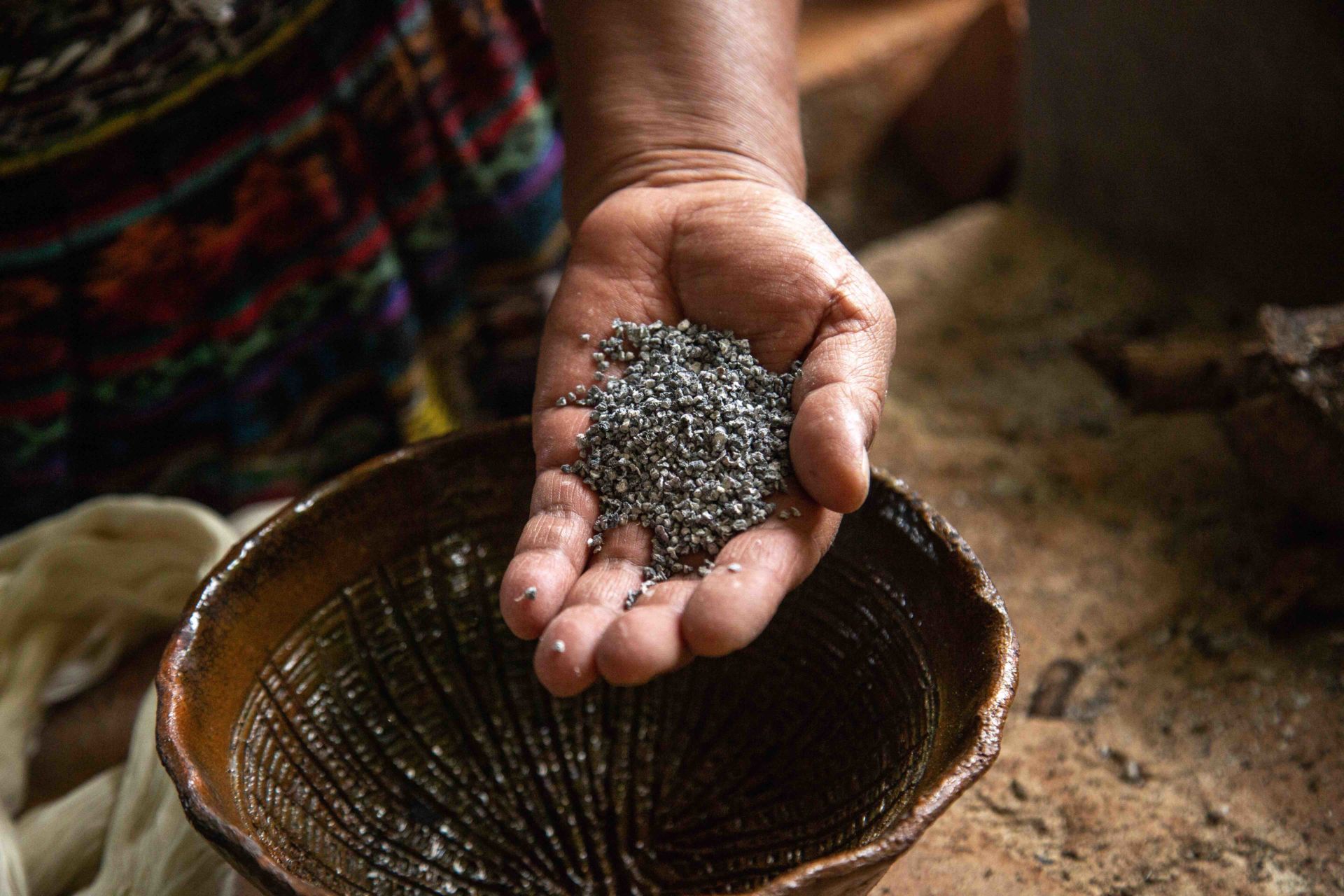This article is part of an editorial collaboration with Heifer International. It was first published on the Heifer International blog.
In San Juan La Laguna, Guatemala, Indigenous Maya women are reclaiming the age-old art of handcrafting carmine, perhaps the most vibrant natural red dye in existence, and through the support of Heifer International, they’re using that skill to boost their own small businesses.
WHAT IS CARMINE?
Carmine is derived from female cochineal insects, tiny bugs that spend their short lives sucking nutrients and moisture from the nopal cactus. Technically, they are parasites. Female cochineal contain high concentrations of carminic acid, a substance that deters larger insects from feasting on the cochineal as they, in turn, enjoy a cactus snack. It is this carminic acid that gives cochineal dye its color.
Indigenous peoples of Central and South America, including the Aztec and Maya peoples, have used cochineal in textile-making for centuries and are responsible for introducing the dye to the European world. Once extremely sought after as the best source of lasting, crimson-red coloring, cochineal dye drastically decreased in value and popularity after the advent of cheap, synthetic dyes. Once a highly profitable enterprise for small-scale producers in Guatemala, cochineal has all but disappeared in favor of new cash crops: coffee and cardamom.
BRINGING COCHINEAL BACK TO GUATEMALA

Heifer Guatemala is partnering with Indigenous women to bring artisanal production of carmine back through the Women’s Empowerment and Entrepreneurship project. The project focuses on building up existing, women-led businesses and helping women access the skills and tools they need to earn a living income, or the amount of money each person in a household needs per day to live a dignified life, through their work. In northern Guatemala, where San Juan is located, the living income benchmark is $1.98 a day but many individuals do not reach that mark. Additionally, because households in this region are primarily male-led with tradition dictating that wives stay home, many women don’t have an independent source of income and have to rely on their spouses for money. With little to no income of their own, women often have to sacrifice nutritious food, clean water, shelter, health care, education or other essentials for their families. Heifer Guatemala is working together with people like Rosa Tay to change that.
ROSA TAY AND THE LEMA’ ASSOCIATION
Tay has been an active part of San Juan La Laguna’s textile industry for 18 years. Like most of the residents of San Juan La Laguna, she identifies as Tzʼutujil Maya, one of many Indigenous groups in Guatemala. Tay is a traditional weaver who learned the ancient art from her grandmother, who also taught her how to use local plants and insects, like the cochineal, to create brilliant dyes. In turn, she taught her own children. But as arts like these became scarce in the country, Tay was no longer satisfied in educating just her own family, Tay founded Asociación Lema’ in 1999, now one of San Juan La Laguna’s oldest weaving cooperatives, to preserve the traditional artisan practices of the Tzʼutujil people and help other women in her community earn income.

But Lema’ was not able to produce their own carmine commercially, and it was not cheap to import. Tay and other women of Lema’ were obliged to order cochineal in bulk from Mexico if they wanted it, at 350 quetzales a pound — almost $45 – the dye was too pricey for most to afford.
In 2017, Tay saw an opportunity and joined the Women’s Empowerment and Entrepreneurship project, and she presented her cochineal business plan to Heifer. “Heifer visited us … and we presented our needs to them, and they made a diagnosis of our situation,” Tay said. “We asked them to help us with a cochineal project that we had in mind because the color is very useful and important in our textiles. That’s why we (Lema’) are the first organization working on this project.” Thanks to Tay’s initiative, local weavers and artisans can now purchase an ounce of dried cochineal (enough to dye two skeins of cotton yarn) for 50 quetzales – about $6.
Related Articles: In the Face of COVID-19, Farmers in Ecuador Innovate a Whole New Food System | Bridging Divides Between Health and Food Systems
Heifer International works alongside local farmers and food producers to strengthen agricultural value chains and open up new markets, and this expands economic opportunities for local communities and enables families like Rosa Tay’s to increase their incomes.
In this video, Rosa explains how working with Heifer Guatemala’s Women’s Empowerment and Entrepreneurship project helped her existing brand, Artesanias Tay, grow and thrive.
In this particular case, Heifer provided an analysis of Tay’s existing operation,then organized workshops to increase entrepreneurial skills and market connections, helped secure access to finance and facilitated savings groups. Heifer also worked through the logistics of carmine production with Tay and Lema’.
INDIGENOUS WOMEN EARN INCOME THROUGH TEXTILES

The new aspect of the business is improving incomes among weavers, who can sell a scarf that takes about two days of work and earn 65-75 quetzales, or around $8-10. The local Lema’ retail store also created 17 jobs in the town. “By selling their products they are allowed to send their kids to school,” Tay said. “That’s one of the major things that happen to women. It’s an achievement.”
With the onslaught of the COVID-19 pandemic making business especially difficult, Heifer Guatemala hosted an intensive six-week training for participants in the project. In these trainings, women learned how to use social media marketing and other digital sales tools to ensure sales continue even when markets are closed. Heifer Guatemala helped business owners establish an online presence if they had none and helped businesses that were already online improve their channels and learn how to appropriately manage their business pages.
You can find the Asociación Lema’ online through their Facebook page and you can explore other businesses that Heifer Guatemala is working with through theWomen’s Empowerment and Entrepreneurship project at movamosaguate.heiferguatemala.org
— —
About the Author: Bethany Ivie is a Communications Officer at Heifer International.
Editor’s Note: The opinions expressed here by Impakter.com columnists are their own, not those of Impakter.com. — In the Featured Photo: Rosalina grinds up dried cochineal in a bowel as she prepares to dye yarn. Featured Photo Credit: Russell Powell.









